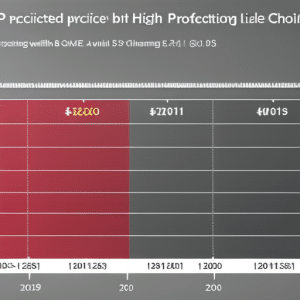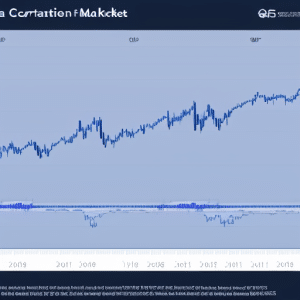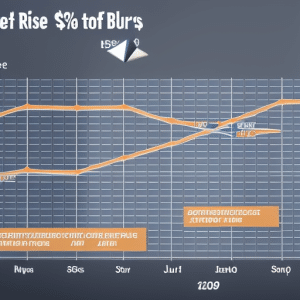Ethereum is a decentralized platform for applications that run precisely as programmed without any chance of fraud, censorship or third-party interference. It was first proposed in 2013 by Vitalik Buterin and has since grown to become one of the largest blockchain networks in the world. Ethereum’s native cryptocurrency, ether (ETH), is widely regarded as one of the leading digital assets available today. This article will explore whether investing in Ethereum is worth it given its historical price performance and unique features compared to other blockchains. We’ll examine the risks associated with Ethereum investments, how to invest in this asset class, and what strategies investors can use to maximize their returns. Finally, we will provide an analysis on whether investing in Ethereum is truly worth it or not.
Key Takeaways
- Knowledge of current asset state is crucial before making any investment decisions
- Diversifying the portfolio with other assets and currencies can help minimize risk and provide stability
- Understanding technical analysis and market behavior can lead to higher returns in Ethereum investment
- Creating a well-thought-out buying strategy and diversification plan can increase chances of achieving maximum returns
Brief Overview of Ethereum
Ethereum is an open-source blockchain platform, often likened to a virtual country in which the citizens are the users of Ethereum. It is built on blockchain technology and has been used as a platform for token offerings since its launch in 2015. Ethereum provides users with access to smart contracts, allowing them to create decentralized applications (dApps) that run on Ethereum’s blockchain network. The platform also supports cryptocurrency transactions, giving users the ability to securely transfer money without relying on centralized institutions like banks and governments. Its decentralized nature makes it resistant to censorship and fraud, meaning that transactions are immutable once they occur.
Ethereum has seen a steady growth in its price over time but has also experienced periods of volatility due to external factors such as market sentiment or regulatory updates. As such, investors need to be aware of these risks before investing in Ethereum or any other cryptocurrency asset class. While there are many potential benefits associated with using Ethereum, understanding the historical price performance of this asset class is essential for making informed investment decisions.
Historical Price Performance
Historically, Ethereum has demonstrated a remarkable level of volatility in its price performance. Since its launch in July 2015, the cryptocurrency has experienced huge swings from an all-time high of around $1400 USD to a low of less than $100. The main factors behind these extreme highs and lows include technical issues such as scalability issues which can make the platform outdated compared to competitors like EOS and Tron. Additionally, Ethereum’s ICO boom of 2017 caused prices to skyrocket before crashing back down due to regulatory pressure on exchanges that traded tokens generated from those ICOs. Despite some scalability issues, many investors remain bullish on Ethereum’s long-term potential but it is uncertain how much further it could fall before reaching stability again. This transition into what makes Ethereum different will be explored further in the next section.
What Makes Ethereum Different?
Ethereum is a blockchain network that has become increasingly popular due to its potential for long-term growth, decentralized nature, and smart contracts. The Ethereum platform was first proposed in 2013 by Vitalik Buterin and has since been adopted by many companies and individuals as an alternative to traditional networks. Ethereum is unique compared to other blockchain networks because it allows users to create their own applications on the blockchain using a programming language called Solidity. This feature makes it possible for developers to create automated, secure contracts known as smart contracts which can be used in various different ways such as digital identity management or financial transactions. Furthermore, Ethereum’s decentralized nature provides additional security measures and helps ensure that data is kept secure over time.
Potential for long-term growth
The potential for long-term growth of Ethereum is symbolized by its ever-evolving technology and increasing demand. Long term trends for the cryptocurrency indicate that the market is beginning to expand, with an influx of investors seeking to capitalize on Ethereum’s innovative platform. However, there are still scalability issues that need to be addressed in order for the technology to reach its full potential. Despite this, many believe that Ethereum will continue to grow as it solves existing problems and meets current market needs.
In addition to being a viable investment option, Ethereum’s decentralized nature provides users with security and privacy unlike most other cryptocurrencies. This means that transactions are not subject to third-party interference or manipulation, providing users with a greater sense of safety when using the network. Additionally, decentralization enables smart contracts which allow businesses and individuals alike to enter into agreements without additional costs or intermediaries. As such, this feature makes Ethereum attractive from both an investment perspective as well as an opportunity for development and innovation within various industries. With these features in mind, it can be seen why many consider Ethereum as a worthwhile endeavor looking ahead towards future growth potential.
Decentralized nature
Utilizing blockchain technology, Ethereum offers a decentralized platform that provides users with security and privacy. Ethereum’s decentralized nature is especially well-suited for Decentralized Finance (DeFi), providing users with the ability to engage in financial activities without relying on a central governing body or third-party intermediary. The advantages of this approach are numerous: it eliminates single points of failure, it facilitates censorship resistance, and it allows users to control their own funds without any outside influence.
The technology underlying Ethereum also enables the development of smart contracts. Smart contracts are self-executing pieces of code that automatically execute when certain predetermined conditions have been met. This has enabled developers to create powerful applications that can be used for anything from asset management to automated banking services. By utilizing these smart contracts, developers can create secure and efficient financial applications while simultaneously ensuring the user’s privacy and autonomy over their digital assets.
Smart contracts
Smart contracts are powerful tools that offer a range of capabilities, including the ability to facilitate trustless and secure transactions without relying on third-party intermediaries. These contracts can be deployed on open source platforms like Ethereum and can be used for a myriad of applications, such as voting systems, digital asset transfers, financial agreements, data storage, and more. Key benefits include:
- Lower transaction costs compared to traditional payment methods
- Faster execution times due to automation
- Reduced risk of fraud or manipulation as all parties involved have access to the same information
- Greater transparency as all details are recorded in an immutable blockchain ledger. Smart contract applications provide numerous advantages over their traditional counterparts and will likely continue to gain traction in the near future. As such, it is clear that Ethereum offers a compelling proposition for investors looking for new opportunities in this emerging field. Transitioning into the next section, it is essential to consider what risks one might face when investing in Ethereum.
What are the Risks of Investing in Ethereum?
Investing in Ethereum comes with certain risks that must be considered before investing. Regulatory uncertainty and the potential for price manipulation remain a concern, as well as security threats from hackers. As such, it is important to be aware of these risks when assessing whether or not to invest in Ethereum. It is also imperative to understand the underlying technology, potential benefits, and associated market conditions before making any investment decisions.
Regulatory uncertainty
Regulatory uncertainty surrounding the Ethereum cryptocurrency has been a major impediment to its widespread adoption. Decentralization, by nature of cryptocurrencies such as Ethereum, have posed a challenge to traditional regulatory structures due to their distributed and global nature. This lack of clear regulation in many jurisdictions has created an environment of caution for potential investors exploring the market. Furthermore, regulations that are applied with varying standards from jurisdiction to jurisdiction also add complexity and confusion for those investing in the space.
The following table highlights some of the key areas in which uncertainty has had an impact on Ethereum:
| Impact | Regulatory Impact | Decentralization Impact |
|---|---|---|
| Price Stability | Difficult to implement government stabilizing measures | Price fluctuations driven by supply & demand |
| Market Manipulation | Difficulty enforcing rules against market manipulation & fraud | No central authority or institution controlling prices |
| ICO Regulations | Unregulated ICOs can lead to fraudulent activities with no recourse | No legal tender status for cryptocurrencies |
Overall, these uncertain conditions continue to pose a threat to investors who are looking at Ethereum as an investment vehicle, making it difficult for them make informed decisions. While the decentralized aspects of cryptocurrency may offer distinct advantages over traditional financial instruments, this lack of regulatory clarity creates risk that must be considered when deciding whether or not Ethereum is worth investing in.
Hackers and security threats
The regulatory uncertainty that surrounds Ethereum can be a concern to potential investors, however another area of risk is the ever-present threat of cybercrime. While blockchain technology has made it difficult for hackers to tamper with the ledger itself, there have been numerous instances where individuals have had their wallets stolen by hackers. The amount of wallet theft has increased as more people buy Ethereum and store it in their wallets. Cybercriminals may also attempt to manipulate the price of Ethereum through various methods such as spoofing or wash trading. As such, investing in Ethereum comes with an inherent risk that must be managed responsibly in order to protect against losses due to malicious activities. In addition, this also means that potential investors should be aware of the potential for price manipulation when considering buying Ethereum.
Potential for price manipulation
Price-fixing practices can have a drastic effect on the investment potential of cryptocurrencies, making it essential for investors to remain alert to such possibilities. Cryptocurrencies such as Ethereum are particularly vulnerable to market manipulation due to their inherent price volatility. This makes them attractive targets for traders looking to exploit their high degree of liquidity and take advantage of short-term price changes. Market manipulation can be achieved through a variety of methods, including pump and dump schemes, wash trading, spoofing and other deceptive trading strategies. As a result, investors must be aware of the risks associated with investing in Ethereum and take appropriate steps to protect themselves from potential losses due to malicious actors. By doing so, they can ensure that their investments are not subject to excessive price fluctuations caused by manipulative trading practices. With this knowledge in hand, they can make informed decisions about whether or not Ethereum is worth investing in. As such, it is essential for investors to understand the potential pitfalls of investing in Ethereum before they commit any funds into the project. Moving forward, it is clear that an awareness of these risks will be key in determining whether or not Ethereum has long-term investment potential.
What are the Benefits of Investing in Ethereum?
Investing in Ethereum has some potential benefits that may make it attractive to investors. Firstly, there is the potential for high returns on investment due to its volatile nature and rising value. Secondly, Ethereum also offers low transaction fees relative to other forms of online payment. Finally, Ethereum is easily accessible and highly liquid which makes it a desirable asset for those looking for quick returns.
Potential for high returns
Due to Ethereum’s volatility in the market, speculating on its price may offer investors the potential for high returns. For those willing to take on the risk, investing in Ethereum offers numerous rewards. Firstly, investors can benefit from a diversified portfolio when they purchase Ethereum as it provides an alternative to traditional investments. Secondly, due to Ethereum’s nature as a cryptocurrency, transactions fees are generally much lower than that of other payment services or stock markets. Thirdly, if an investor is able to accurately predict fluctuations in the market and capitalize accordingly, they may be able to realize substantial gains over short periods of time. As such, with careful strategy and research into this sector of investment, individuals have the opportunity to achieve large returns on their investments through Ethereum trading. Despite these benefits however investors must be aware of the inherent risks associated with such speculation and should always consider proper risk management before making any decisions regarding their finances. With all these factors considered, Ethereum has become a viable option for those looking for potential gains from their investments. Transitioning into low transaction fees therefore becomes an important factor when considering whether or not investing in Ethereum is worth it.
Low transaction fees
Utilizing advanced blockchain technology, Ethereum allows users to execute transactions with minimal fees, providing an efficient and cost-effective way to transact business – like a hot knife cutting through butter. Network scalability is an important factor when considering transaction fees; Ethereum’s network supports high throughput of transactions with low latency, making it possible for users to send money quickly and cheaply. Privacy concerns are also addressed by the Ethereum network; all transactions are encrypted using strong cryptographic algorithms which ensures that user data is kept secure at all times.
The low transaction fees associated with Ethereum make it accessible and attractive to many different types of users from all over the world. In addition, the liquidity of Ether (the native cryptocurrency on the Ethereum network) makes it easy for people to buy or sell without waiting too long for orders to be filled. This increases its accessibility even further while allowing more people access to fast and cost-effective financial services. Overall, Ethereum provides a great platform for developers and users alike due to its low transaction costs and increased accessibility and liquidity.
Accessibility and liquidity
The increased accessibility and liquidity of Ether, the native cryptocurrency on the Ethereum network, makes it more attractive to a wider range of users from various locations. The cost efficiency and scalability issues associated with Ethereum make it an attractive option for those looking to invest in cryptocurrency.
One of the main benefits of investing in Ethereum is its easy accessibility, as well as its ability to be exchanged quickly for other cryptocurrencies or fiat currencies. Additionally, Ethereum has low transaction fees compared to other blockchains, which allows users to save money when trading between different coins. Furthermore, Ethereum’s smart contracts enable developers to create innovative applications that can run without any downtime or censorship. Finally, the scalability of Ethereum makes it possible for developers to build large-scale applications quickly and efficiently.
With all these advantages taken into consideration, one can see why many investors are considering investing in the Ether cryptocurrency. As such, understanding how Ether works is essential for anyone looking to gain exposure to this asset class and capitalize on its potential returns.
How to Invest in Ethereum
Investing in Ethereum can be a lucrative opportunity, as the digital currency has increased by nearly 2,000% in value since it was launched in 2015. To maximize your returns when investing in Ethereum, an informed and well-thought-out investing strategy is key. Technical analysis and market behavior should be studied to gain insight into the current state of the asset before taking any action. This knowledge can help investors make more informed decisions that could potentially yield higher returns than just randomly buying or selling Ethereum without any prior research. Additionally, investors should diversify their portfolio with other assets and currencies to minimize risk and provide stability during periods of extreme volatility. By understanding these concepts and incorporating them into an investing strategy, one can increase their chances of success when investing in Ethereum. With the right approach, investors can maximize their potential for profitable returns while minimizing risk exposure.
How to Maximize Your Returns
By understanding the principles of technical analysis and market behavior, investors can improve their chances of maximizing returns when investing in Ethereum. An important part of any successful buying strategy is to diversify holdings and create a plan that takes into account both long-term and short-term objectives. Investors should focus on identifying entry points with a lower risk profile for larger positions, while also looking for opportunities to take advantage of potential price swings by using smaller positions as trades. As markets are unpredictable, having a clear diversification plan in place will help reduce the risk associated with investing in Ethereum.
When it comes to cryptocurrency investment, there is no guarantee that one’s efforts will be rewarded with success; however, by following a well-thought out buying strategy and diversification plan, investors can give themselves the best chance for achieving maximum returns from their investments in Ethereum. With this in mind, it is now time to assess whether or not investing in Ethereum is truly worth it.
The Bottom Line: Is Investing in Ethereum Worth it?
Considering the potential returns and risks associated with investing in cryptocurrency, it is important to assess whether or not such investments would be beneficial for an individual’s portfolio. While Ethereum does have the potential to generate high returns over time, there are a number of factors that may affect its performance in the future. It is essential to consider these future trends when evaluating whether or not Ethereum is worth investing in. Technical analysis can also provide useful insights into how Ethereum might perform in the short term, allowing investors to make more informed decisions about their investment strategies. Ultimately, due to the unpredictable nature of cryptocurrencies, it is impossible to determine whether investing in Ethereum will be profitable without taking into account both current and future market conditions. Therefore, investors should be aware of all potential risks before deciding if Ethereum is worth investing in.







